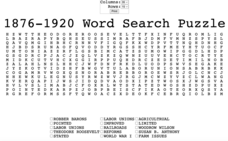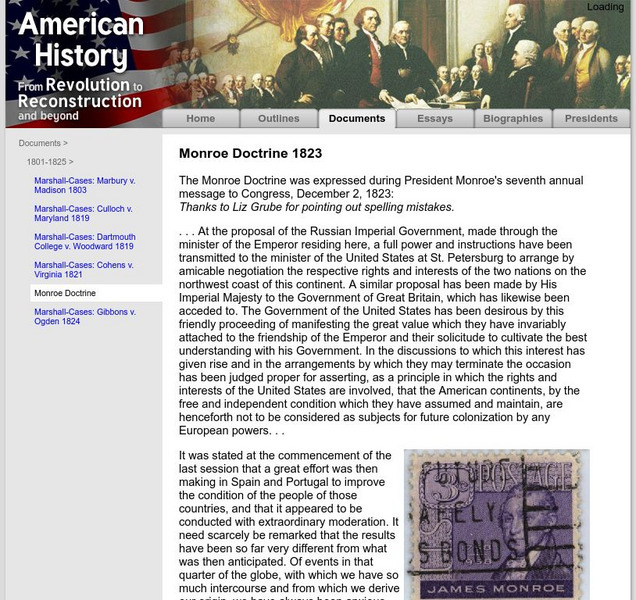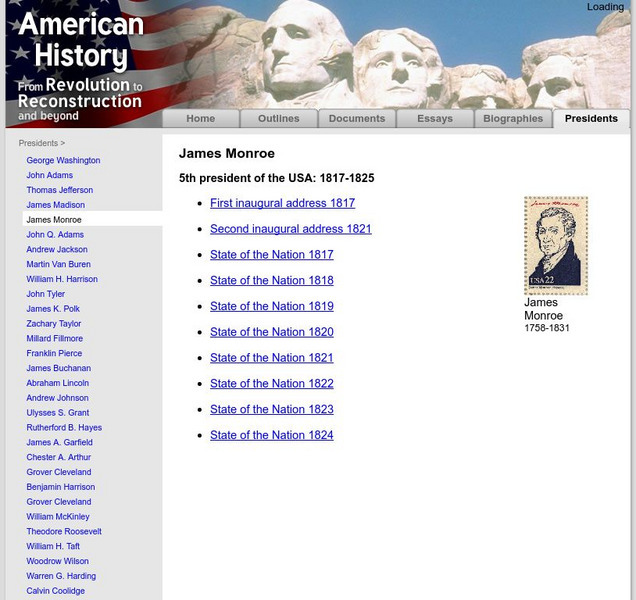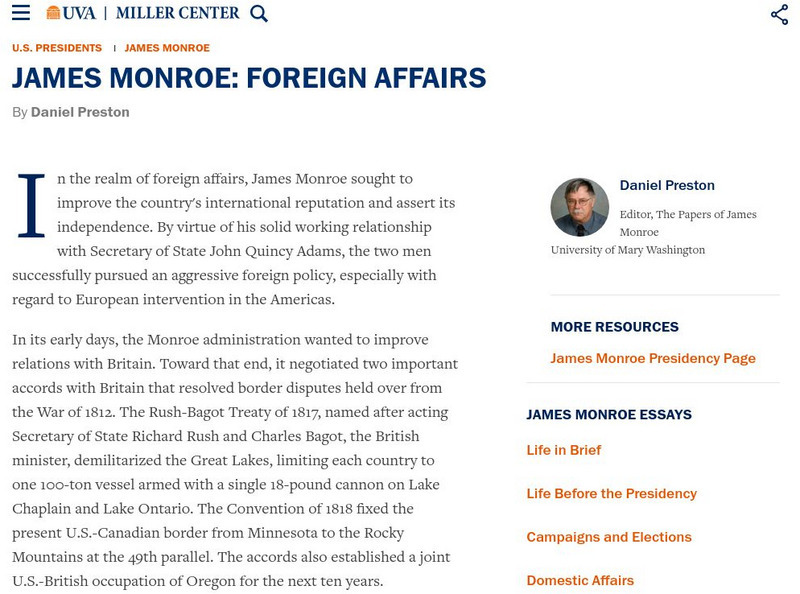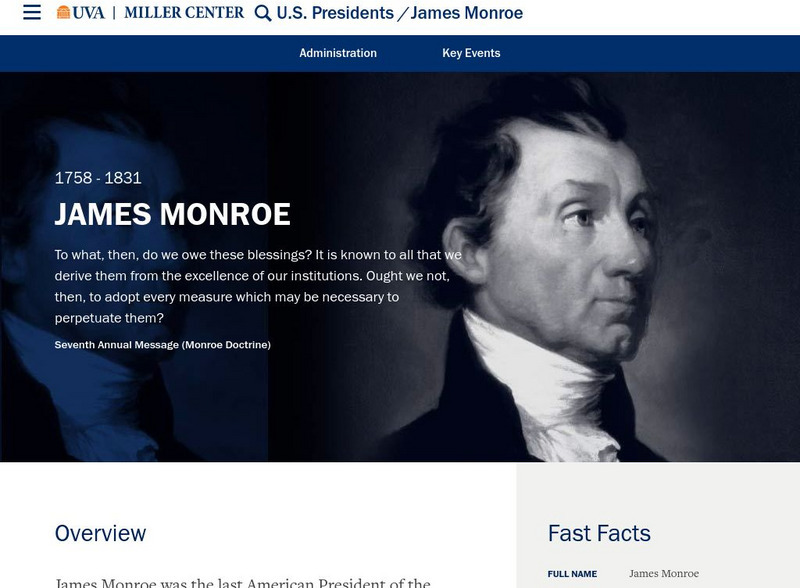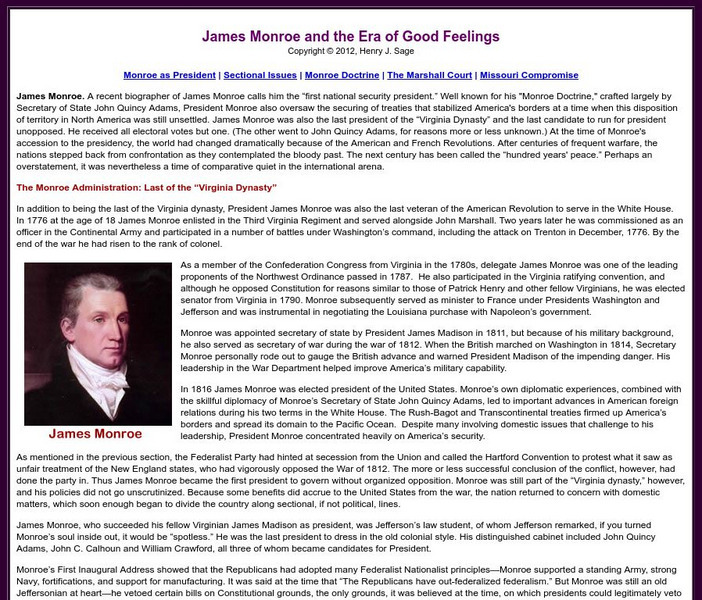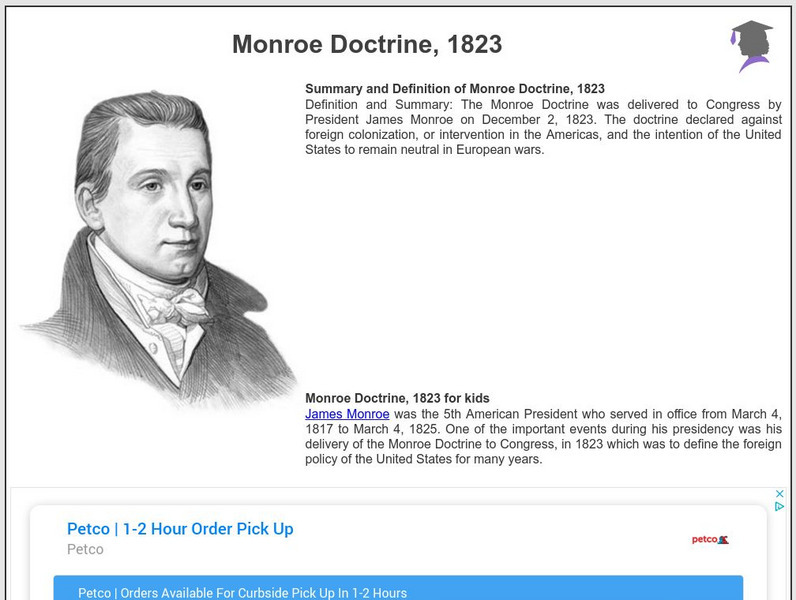Curated OER
The Jeffersonian Age: 1800 - 1824 (5)
In this online interactive American history worksheet, high schoolers answer 15 fill in the blank questions regarding the Jeffersonian Age. Students may submit their answers to be scored.
Curated OER
The Imperial Republic: 1865-1914 (5)
For this online interactive social studies worksheet, students answer 14 matching questions regarding the Imperial Republic. Students may submit their answers to be scored.
Curated OER
War and International Law:America’s Foreign Policy: A Brief History
Students discover the history of American foreign policy. In this foreign policy instructional activity, students listen to their instructor present a lecture that presents a brief history of American foreign policy. Students respond to...
Curated OER
Manifest Destiny
Students identify the implications of Manifest Destiny. In this Westward Expansion lesson, students view a PowerPoint presentation on the topic and then respond to questions based on the details of the presentation.
Curated OER
Imperialism
In this U.S. history worksheet, high schoolers read assigned textbook pages regarding Imperialism and respond to 45 short answer questions.
Curated OER
Cuban Missile Crisis
Eleventh graders determine how causation shaped the Cuban Missile Crisis. In this Cold War lesson, 11th graders examine photographs and documents related to the crisis and analyze the television address that President Kennedy made to the...
Curated OER
U.S. Expansion and the Age of the Empire
In this geography skills activity, students define or identify the 4 terms and concepts related to Teddy Roosevelt's diplomacy. Students also respond to 2 short answer questions.
Curated OER
From a New Nation to a Divided Nation
Quiz your students or prepare them for the big exam with this presentation. Included are 24 multiple choice questions related to Early American Government, The Colonial Period, Westward Expansion, and State Formation.
Curated OER
Diplomatic Duties
Tenth graders research and illustrate the diplomatic policies of American presidents, and write letters critiquing the policies of specific presidents. March 17, 2003)
Curated OER
1876-1920 Word Search Puzzle
In this literacy worksheet, students look for the words in the puzzle that are related to the theme of the word search. Spelling skills are worked on.
US National Archives
Our Documents: The Monroe Doctrine (1823)
The Monroe Doctrine has been used in the past 180 years to let the United States' stance on European involvement in the Western Hemisphere be known. On this interesting site you can view an interactive copy of the original pages of the...
University of Groningen
American History: Documents: Monroe Doctrine 1823
The University of Groningen provides the speech given by President Monroe to the Congress in 1823 in which he advocated the doctrine of noninterference in Europe and nonintervention by Europe in American affairs.
PBS
Pbs Learning Media: Primary Resources: Monroe Doctrine, 1823
A transcript of the Monroe Doctrine written by President James Monroe in 1823. This document established a foreign policy that any European nations attempting to colonize in North or South America would be seen as aggression and the...
National Endowment for the Humanities
Neh: Edsit Ement: The Monroe Doctrine: Origin and Early American Foreign Policy
In this Curriculum Unit, students will consider "The Monroe Doctrine: Origin and Early American Foreign Policy" in 4 Lessons. The unit also includes worksheets and other student materials that can be found under the resource tab.
University of Groningen
American History: Presidents: James Monroe (1758 1831)
This resource provides texts to James Monroe's inaugural addresses and State of the Union addresses. The Monroe Doctrine text is from his 7th annual address to Congress. Links are provided for each of the other presidents, as well.
University of Virginia
Miller Center at Uva: u.s. Presidents: James Monroe: Foreign Affairs
Read a great summary of U.S. foreign policy in the Monroe presidency. Find out about the treaties agreed to and the unilateral issuing of the Monroe Doctrine.
University of Oklahoma
University of Oklahoma: The Monroe Doctrine
This site provides text taken from the Monroe Doctrine.
University of Groningen
American History: Outlines: Latin America and the Monroe Doctrine
Outline of the Latin America independence movement and the accompanying spirit of U.S. support as expressed through the Monroe Doctrine.
CommonLit
Common Lit: The Monroe Doctrine and American Imperialism
A learning module that begins with "The Monroe Doctrine and American Imperialism" by Mike Kubic, accompanied by guided reading questions, assessment questions, and discussion questions. The text can be printed as a PDF or assigned online...
Digital History
Digital History: The Monroe Doctrine and the Roosevelt Corollary [Pdf]
The United States' intervention in Latin American countries has been interpreted in several ways. First read about President Theodore Roosevelt's Corollary to the Monroe Doctrine before investigating the times the corollary was invoked....
University of Virginia
Miller Center at Uva: u.s. Presidents: James Monroe
This site gives a biography of President James Monroe. From the left-hand toolbar, select information about his life before presidency, campaigns and elections, and also domestic affairs. Links to the first lady, cabinet members , and...
Library of Congress
Loc: America's Story: James Monroe
A fascinating look at the life of President James Monroe, and his impact on history. Provides brief articles, portraits, as well as photos of documents from the archives of The Library of Congress.
Henry J. Sage
Sage American History: James Monroe and the Era of Good Feelings
A complete look at the administration of James Monroe and the policies of the Era of Good Feelings. You can read about the domestic policies, foreign affairs, and important decisions of the Supreme Court made during the Monroe...
Siteseen
Siteseen: American Historama: Monroe Doctrine, 1823
Discover important facts and interesting information about the Monroe Doctrine whose purpose was to declare the United States opposition to colonialism and defined the foreign policy of the United States for many years.











